
Opinion: Amtrak Joe’s most consequential ride

Editor’s Note: Sign up to get this weekly column as a newsletter. We’re looking back at the strongest, smartest opinion takes of the week from CNN and other outlets.
CNN —
In April 1917, an impatient revolutionary leader stepped onto a train in Zurich, beginning an 8-day journey home to St. Petersburg. Vladimir Lenin couldn’t wait to intervene in the turmoil that followed the abdication of Russia’s Tsar Nicholas II.
German authorities were happy to let the train carry Lenin and his supporters through their nation, hoping the revolutionaries would further destabilize the shaky government of their wartime enemy. And they did.
Last weekend, a President of the United States secretly boarded a European train and made history of a different kind – aiming to inspire. And he did.
Joe Biden, the onetime Amtrak commuter who now mostly travels by plane and helicopter, embarked from a station in eastern Poland for the nearly 10-hour trip to Kyiv, seated in a rail car paneled in dark wood. There he met with President Volodymyr Zelensky, and proclaimed that despite Russia’s invasion last Feb. 24, “One year later, Kyiv stands. And Ukraine stands. Democracy stands.”
As Frida Ghitis wrote, “The risky trip on Monday to an active war zone was not just a powerful symbol of American support, it was a shot in the arm to a population that has endured Russia’s devastating attacks on civilian apartment blocks, hospitals, schools and the power stations that provide heat and electricity.”
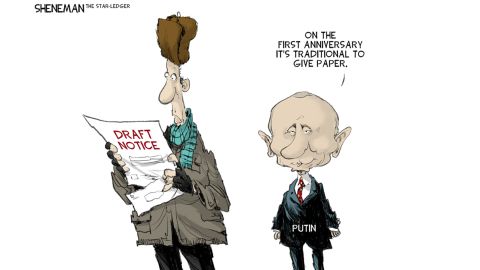
“Who could have imagined in 2022, when Ukraine’s situation looked so hopeless that the United States offered to evacuate Zelensky – and he famously refused – that a year later the Ukrainian people would have put up such a strong resistance, and the West would have given so much support for their efforts? And that instead of (Russian President Vladimir) Putin having a military parade in Kyiv, it would be Biden walking in the Ukrainian capital’s streets, arriving at the ornate Mariinsky Palace, the official residence of the Ukrainian President?”
In the conservative National Review, Mark Antonio Wright observed, “This trip took guts…The moment reminds me not so much of Presidents Bush, Obama, and Trump flying unannounced to Iraq or Afghanistan, but of President Roosevelt’s wartime travels across the Atlantic. Make no mistake, there was risk involved in this trip. Traveling to the capital of a nation fighting a shooting war with a great power, the U.S. had no way to choreograph with exactitude the circumstances of his travel or arrival. Neither the U.S. nor Ukraine has total control of the airspace. Neither the U.S. nor Ukraine could guarantee Biden’s security on the ground.”
Jill Filipovic observed that “a year into Putin’s war, it’s clear that he is willing to sacrifice untold lives to cement his power and Russia’s imperial interests.” She pointed out the Russian president’s effort to ally with culture warriors by attacking the west’s openness to same-sex marriage, among other progressive values.
“Americans have a choice, both at home and abroad: Do we stand with autocrats and their small, hateful view of the world? Or do we stand for freedom and democracy – including the obligation to live among those whose views you don’t agree with and whose choices you wouldn’t make yourself?”
“The decision, and the stakes, couldn’t be clearer,” Filipovic wrote.
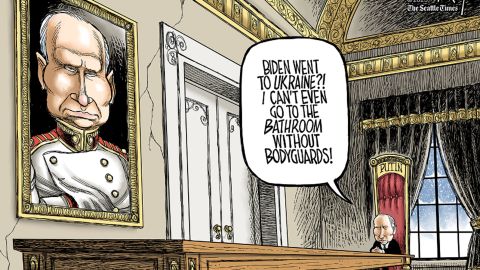
Biden’s critics cited another train – the one that derailed Feb. 3 in East Palestine, Ohio – to try to take the shine off his historic trip. The derailment led to the release and burning of vinyl chloride and stirred fears among residents that their health and community were being endangered.
“Three weeks after the derailment of a freight train carrying hazardous chemical ignited a days-long fire in their town, residents of East Palestine are still waiting for answers,” wrote Ericka L. Copeland, the chapter director of Sierra Club Ohio. “The concerns of environmental groups like ours are focused on the ongoing impacts to the East Palestine community, where people continue to report odors and immediate health problems, chemical residues remain on soils and surfaces, and clean-up and soil removal is ongoing.”
A federal regulator called the derailment “100% preventable.” Former President Donald Trump visited the site Wednesday and said, “You have a president going to Ukraine and you have people in Ohio that are in desperate need of help.”
The former president didn’t mention his own administration’s deregulation efforts, including dropping a rail safety rule instituted by the Obama administration, although experts said it probably wouldn’t have applied to the derailment. Transportation Secretary Pete Buttigieg, who went to East Palestine Thursday, said he regretted not speaking out sooner on the derailment.

Julian Zelizer wrote that “the president needs to reassure the residents of East Palestine and make sure that the town has all the resources it needs for a comprehensive cleanup while calling for the establishment of safety regulations that can diminish the chances of this kind of accident from happening again.”
Still, he noted, the president “has plenty to work with to dispute the kind of claims being leveled by a Republican Party that has focused much more on supply side tax cuts, deregulation, and culture wars than on addressing the kind of crucial issues to emerge through the situation in East Palestine.”
When Kara Alaimo and her husband traveled with their three-year-old on a quick trip to Florida last month, they left their one-year-old child home with extended family. “Travel is such a nightmare that we thought she’d be happier not coming along,” Alaimo wrote.
So Alaimo was pleased to hear that United Airlines will now allow families booking basic economy tickets to snag adjacent seats without additional fees for traveling together.
“United has said it will roll out more family-friendly features this year,” wrote Kara Alaimo. “That’s good to hear, because we really need them…If airlines want to incentivize more families with young kids to travel, they need to make it a whole lot less difficult.”
Paul Hockenos, a US native living in Germany, says he’s not a slow driver but “it’s utterly disconcerting when, ticking along at a brisk 75 miles per hour, somebody blows by me on the left and then disappears over the horizon as if I were driving a lawnmower.”
Germany’s 7,200-mile autobahn network is famous for its long stretches without any speed limit, but now there are questions about whether to invest in it further.
Hockenos wrote that the nation’s “transportation sector’s carbon emissions, say experts, are attributable overwhelmingly to cars and trucks – and the higher the speed of a car, the greater the emissions…”
The “burning question in Germany at the moment is whether tens of billions of euros earmarked for new and broader autobahn wouldn’t do more good building out cycling highways, like in the Netherlands, or an improved high-speed, densely networked rail service.”
“Ultimately, the proclivities of the car zealots have no place in the 21st century when we’re racing against the clock to decarbonize our economies.”
Pressure is building on Congress to protect children online. Patrick T. Brown cited concern about a whistleblower’s release of documents indicating that Instagram’s data “showed the site made ‘body image issues worse for 1 in 3 teen girls,’ and also led to more severe and self-destructive thoughts.”
“While the company disputed the claims, it also postponed an ‘Instagram for Kids’ offering. Cyberbullying and non-consensual nude photo sharing have plagued high schools.”
The Kids Online Safety Act (KOSA), which has bipartisan support, “would require social media sites to default minors into the strongest possible privacy protections and give parents new tools to monitor harmful content. It would mandate social media platforms mitigate harms to minors, such as by restricting or eliminating content relating to self-harm, suicide and eating disorders. And it would set up require an annual audit of risks to minors, including providing broader data access to researchers to study the impact of social media on kids’ development,” Brown wrote.
Meanwhile, Supreme Court justices admitted their confusion about key aspects of the online world last week. “I mean, we’re a court,” said Justice Elena Kagan. “We really don’t know about these things. You know, these are not like the nine greatest experts on the internet.”
They were trying to make sense of the legal status of Section 230 of the Communications Decency Act of 1996, which shields platforms like Google from liability for the content of their sites. The family of Nohemi Gonzalez, a 23-year-old student from California killed by ISIS terrorists in a Paris bistro in 2015, argues that YouTube, owned by Google, should be held legally responsible for its algorithm allegedly promoting terrorist videos online.
Social media companies, Marc Ginsberg wrote, “must be held to account for failing to quickly deploy the resources and technology to prevent extremist content from inciting violence despite earning a financial bonanza across their platforms. Section 230 has shielded their need to make that investment.”
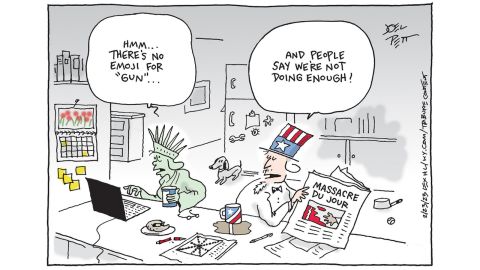

Emily Kohrs, the 30-year-old who was chosen foreperson of the special grand jury investigating claims of voter fraud in Georgia in the 2020 election, rose from obscurity to media stardom within a few days. Kohrs spoke guardedly to major media outlets about the grand jury’s findings, including some of the witnesses and evidence. It is rare to hear publicly from someone in that role, particularly before a case is concluded.
“Kohrs won’t win any prizes for grand jury foreperson etiquette. Her display has been unseemly, to say the least,” wrote Norm Eisen and Fred Wertheimer. “It has violated good taste – but not the law…”
“There is no hint in her remarks of special grand jurors being pressured to decide in one way or another,” they observed.
“The DA may now seek indictments from a regular grand jury that may have read or seen Kohrs’ remarks – but those grand jurors almost certainly have her actual report, so whatever hints Kohrs has dropped are hardly news to them. Any potential targets might argue the statements will influence the trial jurors, but that can be dealt with during jury selection by asking prospective jurors if they heard the statements and were affected by them.”
Oleksandra Matviichuk documents the horrors of the Ukraine war in her role as head of the Center for Civil Liberties, a winner of the Nobel Peace Prize last year. “During those first weeks of the war last year, it was anger that fueled me,” she wrote. “Anger that these Russians with their tanks and artillery and planes should decide they had the right to take away our freedom; anger that they should decide we Ukrainians can’t have a democratic future.”
“Together with other organizations, we have recorded over 31,000 cases of war crimes and abuse of civilians in cities, towns and tiny villages across our country up to the end of 2022. Yes, this is part of a wider effort, collecting evidence towards that goal of holding to account the perpetrators. But we are also telling the human story of what happened – of the pain inflicted on individuals, families and communities – to bring home that this is not a matter of numbers, but people.”
In the days before the war broke out, US ambassador to Moscow John J. Sullivan recalled, there was no real discussion with Russian officials.
They would “read from their talking points and would not engage in a real dialogue. Minders from the Russian security services monitored every meeting and phone call. The Russians were going through a diplomatic charade to lay the groundwork for an invasion that Putin had already decided to launch. The only question was when…The Russians did not negotiate in good faith before the war, and they will not do so now. There is no ‘off ramp’ until Putin achieves his longstanding goals.”
As distant as the goal may be, there’s a path to ending the war, wrote Fareed Zakaria. “It’s possible to imagine a cease-fire that returns all lands captured since February 2022 to Ukraine. Those taken earlier, like Crimea in 2014, would be subject to international arbitration, including local referendums that would be conducted by international groups, not the Russian government. In addition, Ukraine would get security guarantees from NATO, though they would not apply to those disputed territories.”
“That tradeoff – to put it simply, Crimea and parts of the Donbas for de facto NATO and EU membership – is one that could be sold to Ukrainians because they would achieve their long-cherished goal of becoming part of the West. It could be acceptable to Russia because it could claim to have protected some Russian-speaking parts of Ukraine.”
For more:
Marja Heinonen: Finland wants to join NATO. It may have to ditch an old friend to get there
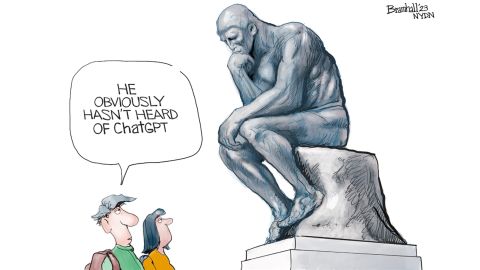
Alice Wong: What I’ve learned being reliant on a caregiver
Kirsten Powers: Bernie Sanders is right about capitalism
Gayle Fleming: Her days as a Black Panther are long behind her. Her path of activism hasn’t ended
Dean Obeidallah: Pence’s plan for a ‘better deal’ on Social Security should be a non-starter
Dan Perry: Netanyahu’s ‘reforms’ are threatening the very foundations of Israel’s democracy
Suzanne Nossel: The greatest casualty in DeSantis’ war on woke speech
Sophia A. Nelson: Meghan Markle’s crash course on Blackness
AND…
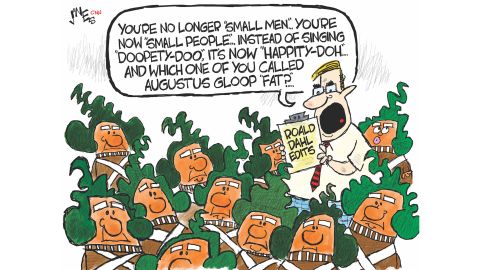
Roald Dahl’s publisher decided it was time to revise some of the language in his classic children’s books, including “Charlie and the Chocolate Factory,” to make sure it doesn’t offend readers in 2023. The Daily Telegraph reported that the words “fat” and “ugly” were dropped, along with a host of other changes.
As Holly Thomas noted, one of the edits clumsily reworked part of “The Witches.”
“In one paragraph describing the witches’ dedication to hunting children no matter what they’re up to, a sentence has been changed from ‘Even if she is working as a cashier in a supermarket or typing letters for a businessman’ to ‘Even if she is working as a top scientist or running a business.”’
“In Dahl’s day, women were less likely to do certain jobs than they are now, and we can accept in good faith that things have changed for the better. Here’s to everyone typing their own emails! However many people still work as cashiers, which is perfectly respectable. The ‘upgrade’ to ‘top scientist’ might be intended as aspirational, but it also bears a trace of snobbery.”
Thomas added, “Like all literature, Dahl’s work is a product of its time, but its modern refurbishment has only served to prove that today’s writers and editors are every bit as fallible as those of the past. Such a fearful approach to historic books, one that treats each volume as though it may be the only one a child will ever consume, undermines the whole point of reading.”
In the Washington Post, book critic Ron Charles noted that the author revised some of his own work: “remember that Dahl himself later changed the original Oompa Loompas from Black pygmies to people with ‘rosy-white’ skin. Over time, as other racist, sexist and ableist elements in beloved stories grow more fetid and indefensible, who’s to say those shouldn’t also be adjusted for children?”
“But move sparingly, even reluctantly, not as a social warrior out to purify the world but as a cautious editor working under the burden of a Hippocratic oath to do no harm.”
After enduring fierce criticism, Penguin Random House announced a compromise: it would continue to publish the classic editions of Dahl’s books, alongside the versions that have been scrubbed by the “sensitivity readers.”
Source: https://www.cnn.com/2023/02/26/opinions/secret-rail-journey-to-kyiv-sends-message-galant/index.html

















